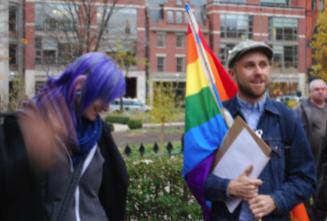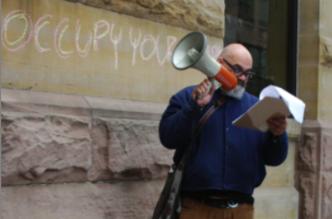
Walk facilitator Jordan Bond Gorr and participant Alissa England get ready to stroll. Credit: Katie Toth
Queer activists and their allies from the Occupy Toronto camp left their tents for a few hours on Nov 13 to march through the city and gaze at some of its most famous gay historic sites.
The Sissy Stroll was organized by the queer contingent of Occupy Toronto, called Occupy the Rainbow, and was meant to encourage other Toronto gays and lesbians to join the camp in St James Park.
However, on Nov 14, Mayor Rob Ford told media he wants protesters out of the park as soon as possible.
The weekend tour blended fact and fiction and was facilitated by local gay activist Roy Mitchell.
At one point Mitchell stopped near the Hard Rock Café to discuss safety issues in historical Yonge St gay bars. He also joked about Anne Murray “discovering her sexuality as she helped kd lang string her first guitar.”
Mitchell says the city’s queer roots are deeper than most young gays and lesbians realize.
Stopping at the bronze statue of Alexander Wood on the corner of Church and Alexander streets, Mitchell relayed the story of the famous “poofster.”
Wood, a colonial merchant from Scotland who later became a magistrate, settled in Toronto in 1797 and later bought 25 acres of wilderness just northeast of where Yonge and Carlton meet today.
Wood became embroiled in a sex scandal in 1810. He was accused of asking soldiers to strip so he could inspect their genitalia after a woman claimed she had been raped by a soldier and left a scar on his penis.
The rumours about Wood became so humiliating that he fled to Scotland only to later return to Toronto and once again become one of the city’s most respected public figures. Wood later returned to Scotland, where he died in 1844.
Mitchell disagrees with Toronto’s glorification of Wood.
“The BIA and the Church St community decided we need this icon, so they got Alexander Wood, this colonial magistrate, to stand up as this sort of radical image of gayness,” he says. “We’re just reclaiming fake history. He’s a . . . colonialist who was a perv. Maybe it’s like trying to look for heroes in the past when all he wanted to do was look at soldiers’ dicks.”
Frank George Hull led parts of the march, waving a pride flag as he drove his motorized wheelchair. Hull, who shared a poem about his lover’s death during the AIDS crisis, said he found the walk “peaceful.”
“I get to tell them my story,” he said. “This walk for me is a way of healing from my pain.”
But Mitchell doesn’t want to see history being repeated for no reason.
“Even though we’re looking at history and history has this modernist idea that it gets better, we have to rethink that and think how can we make it better,” he says.
The stroll returned to St James Park, where discussions of history turned to discussions of activism.
Kim Koyoma, an activist who attended the tour, said some of the issues resonated and reminded him of cutbacks in Toronto.
“We are under threat,” he says. “These issues affect all of us because we’re disproportionately affected by cuts to [public services].”
Occupy the Rainbow participants say they are planning more events, including “free school” discussions on queer theory and direct actions in support of the trans community.
Follow the group’s activity here or on Facebook.


 Why you can trust Xtra
Why you can trust Xtra


